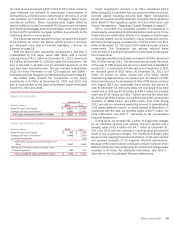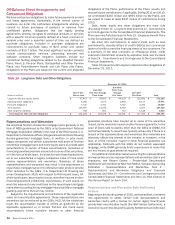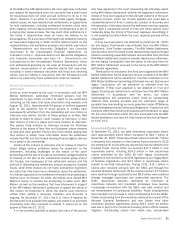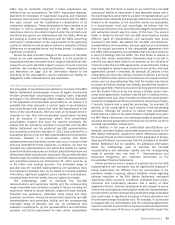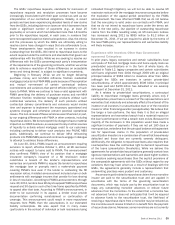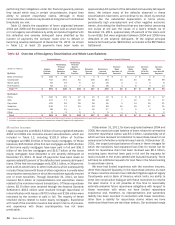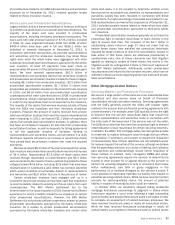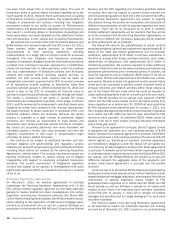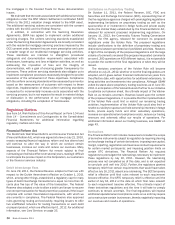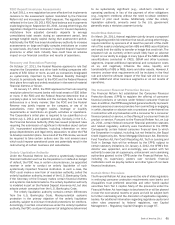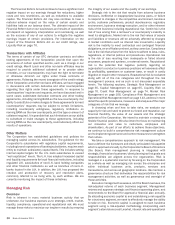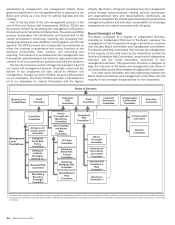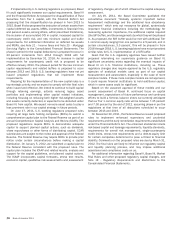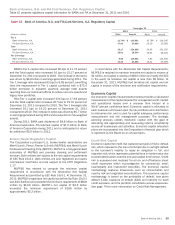Bank of America 2011 Annual Report Download - page 61
Download and view the complete annual report
Please find page 61 of the 2011 Bank of America annual report below. You can navigate through the pages in the report by either clicking on the pages listed below, or by using the keyword search tool below to find specific information within the annual report.Bank of America 2011 59
of the terms of the Servicing Resolution Agreements. The
refinancing assistance commitment under the Servicing
Resolution Agreements is expected to be recognized as lower
interest income in future periods as qualified borrowers pay
reduced interest rates on loans refinanced. Although we may incur
additional operating costs (e.g., servicing costs) to implement
parts of the Servicing Resolution Agreements in future periods, it
is expected that those costs will not be material.
The Servicing Resolution Agreements do not cover claims
arising out of securitization (including representations made to
investors respecting MBS), criminal claims, private claims by
borrowers, claims by certain states for injunctive relief or actual
economic damages to borrowers related to the Mortgage
Electronic Registration Systems, Inc. (MERS), and claims by the
GSEs (including repurchase demands), among other items. Failure
to finalize the documentation related to the Servicing Resolution
Agreements, to obtain the required court and regulatory approvals,
to meet our borrower and refinancing commitments or other
adverse developments with respect to the foregoing could have a
material adverse effect on our financial condition and results of
operations.
Mortgage Electronic Registration Systems, Inc.
Mortgage notes, assignments or other documents are often
required to be maintained and are often necessary to enforce
mortgage loans. There has been significant public commentary
regarding the common industry practice of recording mortgages
in the name of MERS, as nominee on behalf of the note holder,
and whether securitization trusts own the loans purported to be
conveyed to them and have valid liens securing those loans. We
currently use the MERS system for a substantial portion of the
residential mortgage loans that we originate, including loans that
have been sold to investors or securitization trusts. A component
of the OCC consent order requires significant changes in the
manner in which we service loans identifying MERS as the
mortgagee. Additionally, certain local and state governments have
commenced legal actions against us, MERS, and other MERS
members, questioning the validity of the MERS model. Other
challenges have also been made to the process for transferring
mortgage loans to securitization trusts, asserting that having a
mortgagee of record that is different than the holder of the
mortgage note could “break the chain of title” and cloud the
ownership of the loan. In order to foreclose on a mortgage loan,
in certain cases it may be necessary or prudent for an assignment
of the mortgage to be made to the holder of the note, which in the
case of a mortgage held in the name of MERS as nominee would
need to be completed by a MERS signing officer. As such, our
practice is to obtain assignments of mortgages from MERS prior
to instituting foreclosure. If certain required documents are
missing or defective, or if the use of MERS is found not to be valid,
we could be obligated to cure certain defects or in some
circumstances be subject to additional costs and expenses. Our
use of MERS as nominee for the mortgage may also create
reputational risks for us.
Impact of Foreclosure Delays
In 2011, we incurred $1.8 billion of mortgage-related assessments
and waivers costs which included $1.3 billion for compensatory
fees that we expect to be claimed by the GSEs as a result of
foreclosure delays with the remainder being out-of-pocket costs
that we do not expect to recover because of foreclosure delays.
We expect that mortgage-related assessments and waivers costs,
compensatory fees assessed by the GSEs and other costs
associated with foreclosures will remain elevated as additional
loans are delayed in the foreclosure process, although we believe
that the governing contracts, our course of dealing, and collective
past practices and understandings should inform resolution of
these matters. We also expect additional costs related to
resources necessary to perform the foreclosure process
assessment and to implement other operational changes will
continue. This will likely result in continued higher noninterest
expense, including higher default servicing costs and legal
expenses in CRES, and has impacted and may continue to impact
the value of our MSRs related to these serviced loans. It is also
possible that the delays in foreclosure sales may result in
additional costs and expenses, including costs associated with
the maintenance of properties or possible home price declines
while foreclosures are delayed. In addition, required process
changes, including those required under the consent orders with
federal bank regulators, are likely to result in further increases in
our default servicing costs over the longer term. Finally, the time
to complete foreclosure sales may continue to be protracted, which
may result in a greater number of nonperforming loans and
increased servicing advances and may impact the collectability of
such advances and the value of our MSR asset, MBS and real
estate owned properties.
An increase in the time to complete foreclosure sales also may
increase the number of severely delinquent loans in our mortgage
servicing portfolio, result in increasing levels of consumer
nonperforming loans and could have a dampening effect on net
interest margin as nonperforming assets increase. Accordingly,
delays in foreclosure sales, including any delays beyond those
currently anticipated, our continued process enhancements,
including those required under the OCC and Federal Reserve
consent orders and any issues that may arise out of alleged
irregularities in our foreclosure process could significantly increase
the costs associated with our mortgage operations.
Mortgage-related Settlements – Servicing Matters
In connection with the BNY Mellon Settlement, BANA has agreed
to implement certain servicing changes. The Trustee and BANA
have agreed to clarify and conform certain servicing standards
related to loss mitigation. In particular, the BNY Mellon Settlement
would clarify that it is permissible to apply the same loss-mitigation
strategies to the Covered Trusts as are applied to BANA affiliates’
held-for-investment (HFI) portfolios. This portion of the agreement
was effective in the second quarter of 2011 and is not conditioned
on final court approval.
BANA also agreed to transfer the servicing related to certain
high-risk loans to qualified subservicers on a schedule that began
with the signing of the BNY Mellon Settlement. This servicing
transfer protocol will reduce the servicing fees payable to BANA
in the future. Upon final court approval, failure to meet the
established benchmarking standards for loans not in subservicing
arrangements can trigger the payment of agreed-upon fees.
Additionally, we and legacy Countrywide have agreed to work to
resolve with the Trustee certain mortgage documentation issues
related to the enforceability of mortgages in foreclosure and to
reimburse the related Covered Trust for any loss if BANA is unable
to foreclose on the mortgage and the Covered Trust is not made
whole by a title policy because of these documentation issues.
These agreements will terminate if final court approval of the BNY
Mellon Settlement is not obtained, although we could still have
exposure under the pooling and servicing agreements related to


